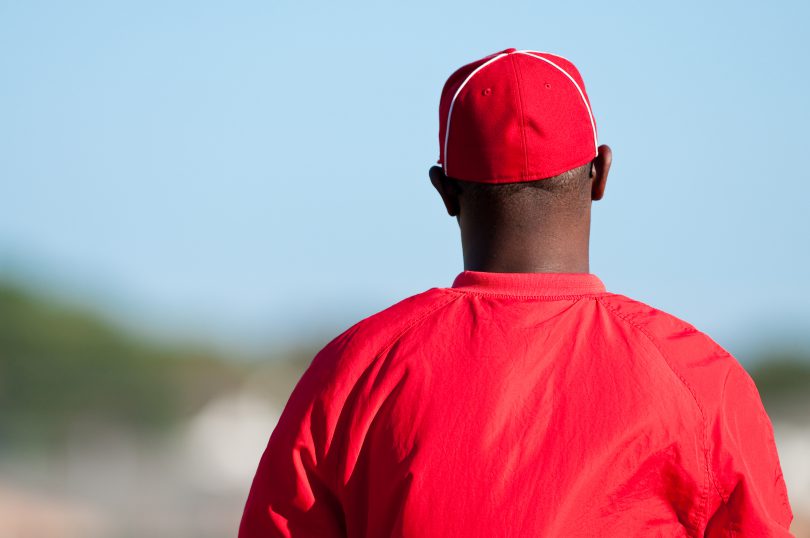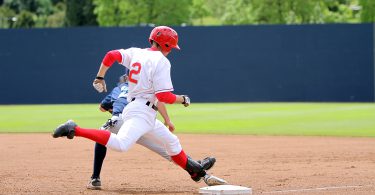Remember the situation with our prospective college player, Alex?
Alex is a good high school baseball player. He found the KPB website early in high school and learned about what he needs to do to play college baseball. He studies hard and his grades are good. He makes a video and sends it out to schools. He receives several letters of interest from coaches who saw the video. He also goes to a local showcase at the end of his junior year where a lot of college coaches are present. He performs well at the showcase and hears from several more interested colleges. It is now the summer after his junior year and his summer team is going to a big national tournament. On his way to the tournament, he stops for a few unofficial visits and is shown around college campuses by the coaches.
John is a college recruiting coordinator. He spends his summers recruiting and he attends many showcases and tournaments. Early in the summer, he goes to a showcase where he sees Alex and a number of other prospects. He gets in touch with Alex and 6 other players and he arranges for them to visit his school on their way to the national tournament. John is also going to the national tournament to see 25 potential recruits at the same event. The event is hectic and takes place at several different high schools and baseball complexes. He tries to see as many of the players on his list as possible, and because of scheduling conflicts and priority players, he is only able to watch 5 innings of Alex’s game before having to leave to see a pitcher who is scheduled to throw. He gets to Alex’s game a little early and has time to watch him warm-up and interact with his teammates.
Without even knowing it, Alex is on John’s shortlist of potential players for his team. Alex isn’t aware, but he and 4 other infielders are being considered for one scholarship. Alex’s chances for the scholarship depend on what he does during the 5 innings that John sees him play. During these 5 innings, Alex can help, hurt, or ruin his chances of earning the scholarship to play college baseball.
So what does Alex do?
Coach John wanders over to the fence near to where Alex is warming up before the game. This is a semi-final game in the national tournament. As Coach John watches Alex, he is surprised that Alex and his teammates are talking about how they can’t wait to go home to see their girlfriends, and what they plan to do when they get back. There is no talk about the game, the other team, or what Alex and his teammates need to do to get ready. As Coach John makes his way over to sit in the stands, he notices Alex checking his phone and sending texts, just minutes before game time. When the game starts, the first play is a slow roller to Alex. He charges and tries to make the difficult play, but fumbles the exchange. It was a difficult play, but it leaves Coach John wondering if Alex would have made that play if he had been a little more focused and prepared. As the game goes on, Coach John notices that Alex doesn’t seem to care about the game as much as he thinks he should. On plays to the opposite side of the field, Alex doesn’t move and he just watches a foul ball that goes over his head and lands just outside the fence. He also isn’t part of any of the chatter on the infield.
Coach John wonders to himself, “How is this kid going to make it through a tough college season and bring focus and energy every day?” While this is just one of Alex’s games, it is an important game and Alex is not “present.” He has low energy and looks like he’s thinking about other things. Earlier in the day, Coach John watched Rick, a player of equal ability who is consistently involved in his game and bringing focused energy to fire up his teammates. Who do you think Coach John will recruit?
Lesson learned:
- Everyone has days where they just don’t feel focused during a game or practice. But players who want to play in college must find ways to remain “present” mentally and physically in every game, even on bad days.
- Recruiters want to see players who are passionate and involved in the game, not players who have their mind elsewhere. The college season is long and players will spend more time on the field than they have at any other level. If prospects seem detached or disinterested, coaches logically think that the behavior will only get worse in college. Passion about the game speaks volumes to recruiters.
- If you want to be recruited, you need to show that you are “present” for every game, every play, and every pitch. How do you do that?
- Talk it up on the field.
- Talk baseball.
- Show you are involved with the game (signal the outs, talk to your teammates about earlier plays, know the situation before every pitch).
- Go after balls in the field until you are 100% sure there will be no play.
- Encourage your teammates on and off the field.
- Have fun! Show some positive intensity.
- Play every game like it’s a championship game.
- Avoid anything that will look like you don’t care or you have better things to do.
- This is your chance to take charge of your future. Everything else can wait.
- Don’t check your cell phone or send texts while at the field or in the dugout.
- Don’t talk with fans in the stands or show more interest in them than in the game. No one will be insulted if you tell friends and family before the game that you want to stay focused.
- Don’t talk about anything you would be embarrassed to have a college coach or recruiter hear. If you’re in a public place, anything can be overheard.
Want to hear this in podcast format? Click play below!







